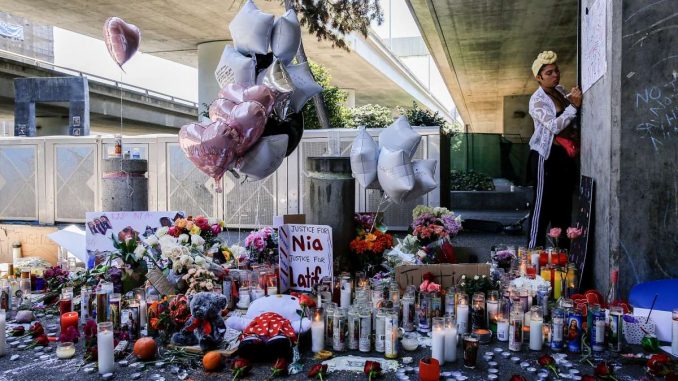
On the night of July 22nd, 18-year-old Nia Wilson and her 26-year-old sister Lahtifa were brutally attacked as they were waiting to transfer to a train at MacArthur BART in Oakland. John Lee Cowell walked up from behind and stabbed both sisters in the neck. As Nia bled to death in her sister’s arms, Lahtifa saw Cowell look back at them, wipe the knife and go down the stairs. He left the station, went to the parking structure, changed his shirt and ditched his backpack. A passenger saw him 20 hours later, riding BART. He was arrested at a BART station.
The Bay Area has been gripped by horror at this brutal murder. Wilson’s family has been devastated by having Nia ripped away from them forever, with her father saying how he was “supposed to be planning her graduation, not her funeral.” And when the news of the murder was reported, hundreds of people marched in the streets of Oakland.
Nia and Latifah are Black, Cowell is white. People are speculating whether this was a premeditated racist attack. How could someone, like Cowell, who is mentally ill and living on the streets, not be infected by racism? The racism of this society is inescapable. We may never know his motive, if he had one. But we know the racism and violence of this society.
Last year 77 people were murdered in Oakland, three quarters of whom were Black. In America today, Black women die of homicide at three times the rate of white women. Nia, like many young Black women in Oakland, was doing her best to build a life for herself. Her high school teacher recalled how Wilson’s daily walk from the bus stop to school meant having to deal with threats and harassment from men on the streets. Just two years ago, Nia held a friend of hers as she bled to death after being shot while they were at a memorial for a close friend in Oakland.
But Nia wasn’t killed by the violence that plagues many of the poorest neighborhoods in the country, the sort of violence that builds up when neighborhoods are left to decay when decent paying jobs are unavailable, when schools are closed and under funded, and when people are pushed out of their homes as housing costs skyrocket. This is the violence of poverty in a society that is run in the interests of the 1%. Nia escaped this violence only to be targeted by a mentally ill man.
Cowell, who is 27 years old, was known as a dangerous person with a history of crime and violence. His family says he suffers from bipolar disorder and schizophrenia, both serious mental disorders that can include delusions and violent urges. Most of Cowell’s life was spent in and out of jail or mental institutions. Cowell, like many others with mental illness, was thrown away by society.
Cowell’s family was unable to take care of him or control his behavior. There is no real care provided for people plagued by mental illness, so Cowell had been living on the streets between stints in prison. It’s no accident that one third of all homeless people are struggling with mental illness, along with half of all incarcerated people. Prison and street life are harsh, dangerous, violent, and only make mental illness worse. Whether in prison or on the streets, some of these people turn to drugs, others suicide, and some like Cowell commit the kind of violence that killed Nia. These actions are as much products of the violence of society as they are individual actions.
We live in a society that is full of many forms of violence – and at its roots it is the violence of this system. A small minority controls the vast wealth and resources produced by the workers of society. Making a profit, not the quality of our lives, is central to this system. As a result, millions live in poverty and are cast aside, and the majority work just to survive and try to have some level of stability.
Sometimes when the violence seems so outrageous, like Nia’s murder, people are outraged and respond with collective action. But it can’t just be a temporary response. If there is to be a future for young people like Nia, it is going to depend on how we organize and collectively fight for a society that values all human life more than the lives of the super rich and their profits.

